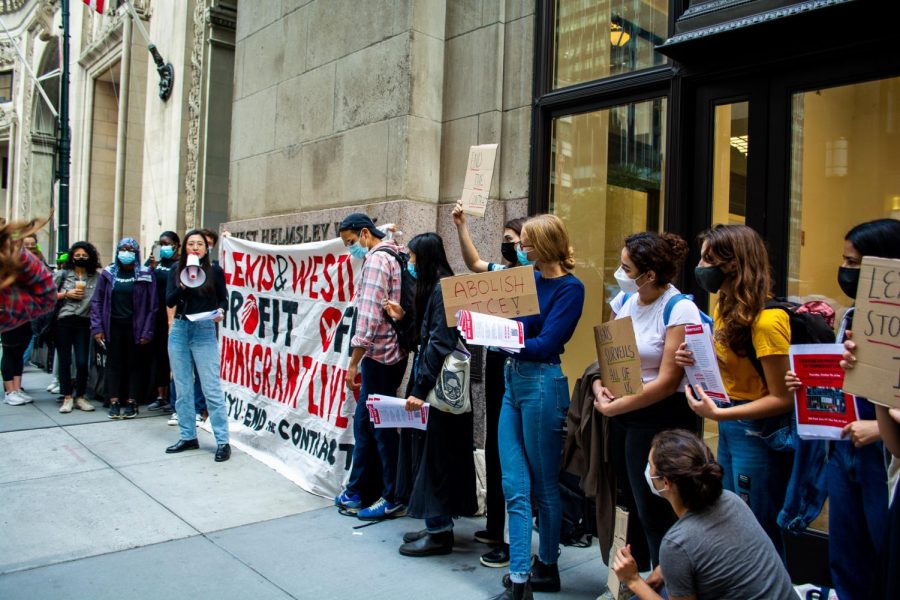Law students push for NYU to cut ties with legal databases over ICE links
Students from more than 20 law schools across the country, including NYU Law, have launched a week of protest calling for their administrations to cut ties with two legal databases that provide immigrants’ personal data to ICE.
On Thursday, Oct. 7, law students rallied outside the Park Avenue headquarters of LexisNexis. NYU School of Law students joined students from more than 20 law schools across the country to demand that universities end their contracts with legal databases Westlaw and LexisNexis to pressure their owners to cut ties with the U.S. Immigration and Customs Enforcement. (Staff Photo by Manasa Gudavalli)
October 8, 2021
Students at the NYU School of Law have joined a national campaign calling for universities to stop purchasing access to two legal databases linked to U.S. Immigration and Customs Enforcement. Dozens of law students, including some from NYU Law, rallied outside the Park Avenue headquarters of LexisNexis on Oct. 7, chanting, “Say it once, say it twice, we will not put up with ICE!”
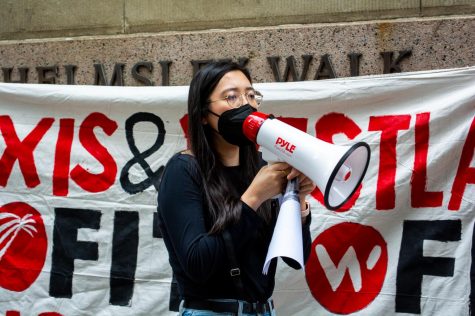
Student groups from more than 20 law schools across the country formed the End the Contract Coalition over the summer. The group launched a week of action starting Oct. 4, including a webinar, rallies and social media campaigning. They are demanding that universities end their contracts with legal databases Westlaw and LexisNexis to pressure the databases’ owners to cut ties with ICE.
The databases are widely used by law students, librarians and attorneys researching court cases and other legal proceedings. But their parent corporations Thomson Reuters and RELX, respectively, also collect personal data on millions of people using their software and databases, which they then sell to police and immigration authorities.
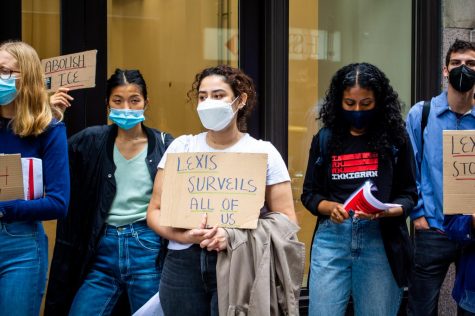
In June 2018, Privacy International reviewed federal documents showing that Thomson Reuters provides ICE with personal data on more than 500,000 people per month, including phone, utility, insurance, tax and banking records. In 2019, The New York Times Magazine detailed how ICE uses a Thomson Reuters-made database called CLEAR to target immigrants for arrest and deportation.
In an email to WSN, Dave Moran, a spokesperson for Thomson Reuters, said that the technologies it sells to the Department of Homeland Security, which administers ICE, are not specifically targeted toward the arrest or deportation of immigrants.
“We work with the DHS in their efforts to investigate crimes such as child abduction and human trafficking, drug and weapons smuggling, and money laundering,” Moran wrote. “Our products do not contain data on an individual’s immigration or citizenship status or their ability to work or live in the U.S. and does not specifically license or provide data on non-U.S. residents. Also, they are not designed to be used for mass illegal immigration inquiries and it is not an effective tool for addressing this issue.”
In April 2021, a report by The Intercept found that LexisNexis holds a $16.8 million data-sharing contract with ICE, giving the agency proprietary access to “10,000 different data points on hundreds of millions of people.”
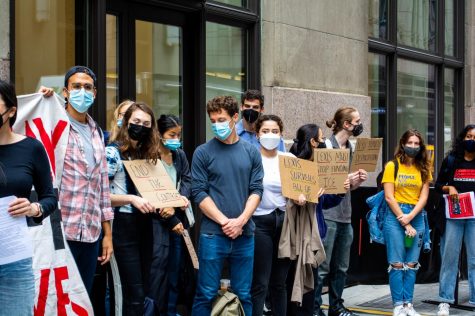
Third-year NYU Law student Marisa O’Toole said the coalition aims to spread awareness of the contracts among the broader public in order to put pressure on law school administrations.
“The point here is to really leverage our power as law students,” O’Toole said. “The biggest thing we can do is mobilize together collectively and push our law school to do better and to be accountable … The end goal is for these contracts that Lexis and Westlaw have with ICE to end immediately.”
Chiraayu Gosrani, another NYU Law third-year and coalition member, said that law schools and the legal community at large need to reconsider their dependence on the databases.
“As law students, and as legal advocates, we have to rely on Lexis and WestLaw,” Gosrani said. “Legal institutions are heavily reliant on and beholden to these private companies that are, on the one hand, tasked with training immigration attorneys. But on the other hand, their parent companies are turning around and signing massive, lucrative data-sharing agreements with ICE that are being used to harm our clients.”
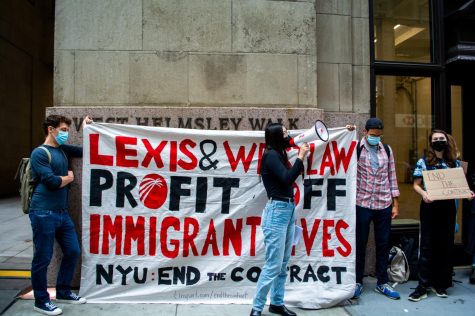
The coalition also held a national webinar on Oct. 4 that drew more than 160 attendees. Among the featured speakers was CUNY School of Law professor Sarah Lamdan, who has been researching the relationship between data brokers and law enforcement agencies like ICE since 2017.
“I didn’t know that these companies were working with ICE and with hundreds of law enforcement agencies — and I found that shocking and disturbing,” Lamdan told WSN. “They’re the gold standard legal research platforms that all lawyers use for their work. But they’re also the government and law enforcement agencies’ main data brokers.”
Coalition members said that on three occasions, NYU administration removed a protest banner calling on NYU Law dean Trevor Morrison — who announced Oct. 7 that he is stepping down for unrelated reasons — to end contracts with Westlaw and LexisNexis.
A spokesperson for NYU Law did not deny that the banner was taken down, but said that Dean Morrison was not behind the decision to remove it.
“The Law School welcomes the free exchange of ideas, including through protest,” the spokesperson said. “When students displayed a banner in the courtyard of Vanderbilt Hall on October 5, Dean Morrison went to talk to them to learn more about their concerns. He did not discourage them from protesting and did not say anything about where the banner could be displayed. Our students are told there are policies and processes for displaying signage on our campus, and are asked to remove it outside of permitted locations. It may also be removed if left on Law School property unattended.”
Neither Morrison nor the spokesperson commented on the coalition’s demands for law school deans to end their contracts with LexisNexis and Westlaw and to publicly condemn the companies’ sales to ICE.
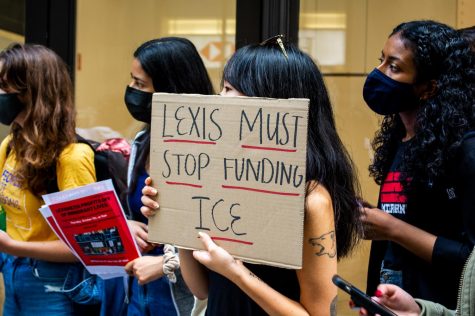
The coalition’s roots are in the #NoTechForICE campaign spearheaded by the Latinx advocacy group Mijente. In 2019, law students and professionals across the country collaborated with #NoTechForICE to draft an open letter to Thomson Reuters and RELX calling on the companies to drop their contracts with ICE.
“Beyond raising professional responsibility red flags, facilitating ICE surveillance violates your codes of corporate responsibility,” the letter stated. “You are participating in surveillance and deportation practices that culminate in the cruel and unethical treatment of vulnerable populations on an almost unprecedented scale … The time is now to stop enabling and profiting from the misery being inflicted on immigrant communities by ICE.”
Contact Suhail Gharaibeh at [email protected].














































































































































